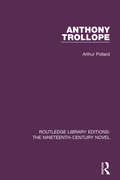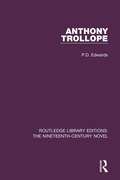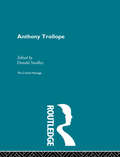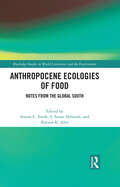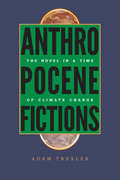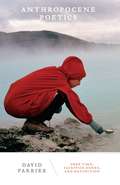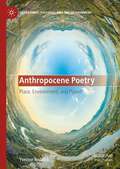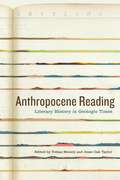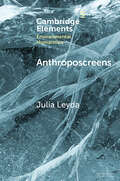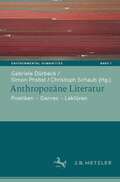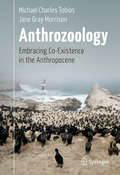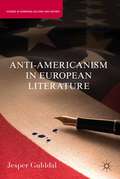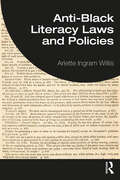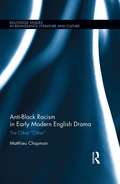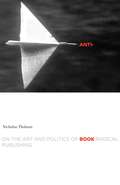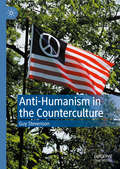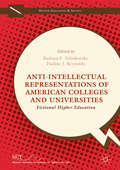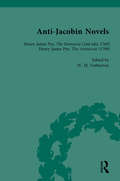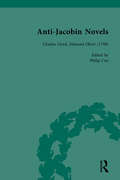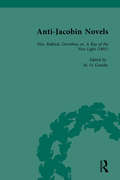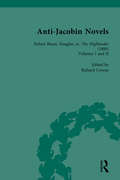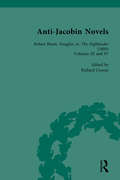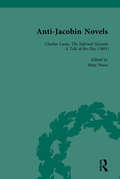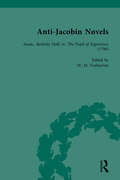- Table View
- List View
Anthony Trollope (Routledge Library Editions: The Nineteenth-Century Novel #32)
by Arthur PollardAnthony Trollope is perhaps best known for the group of Barsetshire novels, a rich and enduring picture of society in a small cathedral town. He also wrote a number of Irish novels and a series about political society known as the ‘Palliser novels’. First published in 1978, this introduction to Trollope’s life and work surveys all of his forty-seven novels, as well as his various miscellaneous works, and calls for a reassessment of his impressive achievement. This book will be of interest to those studying Victorian literature.
Anthony Trollope: His Art And Scope (Routledge Library Editions: The Nineteenth-Century Novel #12)
by P.D. EdwardsFirst published in 1968, this book sets out to refute the idea of Trollope as a ‘mild cathedral-town novelist, describing storms in ecclesiastical tea cups’ which prevailed at the time in spite of his stature during his lifetime. The author reveals the full strength and range of Trollope’s achievement and provides an excellent introduction to further exploration of the novels. Two sections — ‘Narrative Method’ and ‘Subject-Matter’ — are used as the basis from which the author examines key themes in Trollope’s work, with instructive extracts from the novels included to illustrate these points and upon which commentary is provided. This book will be of interest to students of literature.
Anthony Trollope: The Critical Heritage (Critical Heritage Ser.)
by Donald SmalleyFirst Published in 1995. Routledge is an imprint of Taylor & Francis, an informa company.
Anthropocene Ecologies of Food: Notes from the Global South (Routledge Studies in World Literatures and the Environment)
by Simon C EstokAnthropocene Ecologies of Food provides a detailed exploration of cross-cultural aspects of food production, culinary practices, and their ecological underpinning in culture. The authors draw connections between humans and the entire process of global food production focusing on the broad implications these processes have within the geographical and cultural context of India. Each chapter analyzes and critiques existing agricultural/food practices, and representations of aspects of food through various media (such as film, literature, and new media) as they relate to global issues generally and Indian contexts specifically, correcting the omission of analyses focused on the Global South in virtually all of the work that has been done on "Anthropocene ecologies of food." This unique volume employs an ecocritical framework that connects food with the land, in physical and virtual communities, and the book as a whole interrogates the meanings and implications of the Anthropocene itself.
Anthropocene Fictions: The Novel in a Time of Climate Change (Under the Sign of Nature: Explorations in Ecocriticism)
by Adam TrexlerSince the Industrial Revolution, humans have transformed the Earth's atmosphere, committing our planet to more extreme weather, rising sea levels, melting polar ice caps, and mass extinction. This period of observable human impact on the Earth's ecosystems has been called the Anthropocene Age. The anthropogenic climate change that has impacted the Earth has also affected our literature, but criticism of the contemporary novel has not adequately recognized the literary response to this level of environmental crisis. Ecocriticism's theories of place and planet, meanwhile, are troubled by a climate that is neither natural nor under human control. Anthropocene Fictions is the first systematic examination of the hundreds of novels that have been written about anthropogenic climate change.Drawing on climatology, the sociology and philosophy of science, geography, and environmental economics, Adam Trexler argues that the novel has become an essential tool to construct meaning in an age of climate change. The novel expands the reach of climate science beyond the laboratory or model, turning abstract predictions into subjectively tangible experiences of place, identity, and culture. Political and economic organizations are also being transformed by their struggle for sustainability. In turn, the novel has been forced to adapt to new boundaries between truth and fabrication, nature and economies, and individual choice and larger systems of natural phenomena. Anthropocene Fictions argues that new modes of inhabiting climate are of the utmost critical and political importance, when unprecedented scientific consensus has failed to lead to action. Under the Sign of Nature: Explorations in Ecocriticism
Anthropocene Poetics: Deep Time, Sacrifice Zones, and Extinction (Posthumanities #50)
by David FarrierHow poetry can help us think about and live in the Anthropocene by reframing our intimate relationship with geological time The Anthropocene describes how humanity has radically intruded into deep time, the vast timescales that shape the Earth system and all life-forms that it supports. The challenge it poses—how to live in our present moment alongside deep pasts and futures—brings into sharp focus the importance of grasping the nature of our intimate relationship with geological time. In Anthropocene Poetics, David Farrier shows how contemporary poetry by Elizabeth Bishop, Seamus Heaney, Evelyn Reilly, and Christian Bök, among others, provides us with frameworks for thinking about this uncanny sense of time.Looking at a diverse array of lyric and avant-garde poetry from three interrelated perspectives—the Anthropocene and the &“material turn&” in environmental philosophy; the Plantationocene and the role of global capitalism in environmental crisis; and the emergence of multispecies ethics and extinction studies—Farrier rethinks the environmental humanities from a literary critical perspective. Anthropocene Poetics puts a concern with deep time at the center, defining a new poetics for thinking through humanity&’s role as geological agents, the devastation caused by resource extraction, and the looming extinction crisis.
Anthropocene Poetry: Place, Environment, and Planet (Literatures, Cultures, and the Environment)
by Yvonne ReddickAnthropocene Poetry: Place, Environment and Planet argues that the idea of the Anthropocene is inspiring new possibilities for poetry. It can also change the way we read and interpret poems. If environmental poetry was once viewed as linked to place, this book shows how poets are now grappling with environmental issues from the local to the planetary: climate change and the extinction crisis, nuclear weapons and waste, plastic pollution and the petroleum industry. This book intervenes in debates about culture and science, traditional poetic form and experimental ecopoetics, to show how poets are collaborating with environmental scientists and joining environmental activist movements to respond to this time of crisis. From the canonical work of Ted Hughes and Seamus Heaney, to award-winning poets Alice Oswald, Pascale Petit, Kei Miller, and Karen McCarthy Woolf, this book explores major figures from the past alongside acclaimed contemporary voices. It reveals Seamus Heaney’s support for conservation causes and Ted Hughes’s astonishingly forward-thinking research on climate change; it discusses how Pascale Petit has given poetry to Extinction Rebellion and how Karen McCarthy Woolf set sail with scientists to write about plastic pollution. This book deploys research on five poetry archives in the UK, USA and Ireland, and the author’s insider insights into the commissioning processes and collaborative methods that shaped important contemporary poetry publications. Anthropocene Poetry finds that environmental poetry is flourishing in the face of ecological devastation. Such poetry speaks of the anxieties and dilemmas of our age, and searches for paths towards resilience and resistance.
Anthropocene Reading: Literary History in Geologic Times (AnthropoScene)
by Steve Mentz Dana Luciano Jeffrey Jerome Cohen Jennifer Wenzel Benjamin Morgan Thomas H. Ford Stephanie LeMenager Justin Neuman Juliana Chow Noah Heringman Matt Hooley Derek Woods Anne-Lise FrançoisFew terms have garnered more attention recently in the sciences, humanities, and public sphere than the Anthropocene, the proposed epoch in which a human “signature” appears in the lithostratigraphic record. Anthropocene Reading considers the implications of this concept for literary history and critical method.Entering into conversation with geologists and geographers, this volume reinterprets the cultural past in relation to the anthropogenic transformation of the Earth system while showcasing how literary analysis may help us conceptualize this geohistorical event. The contributors examine how a range of literary texts, from The Tempest to contemporary dystopian novels to the poetry of Emily Dickinson, mediate the convergence of the social institutions, energy regimes, and planetary systems that support the reproduction of life. They explore the long-standing dialogue between imaginative literature and the earth sciences and show how scientists, novelists, and poets represent intersections of geological and human timescales, the deep past and a posthuman future, political exigency and the carbon cycle.Accessibly written and representing a range of methodological perspectives, the essays in this volume consider what it means to read literary history in the Anthropocene.Contributors include Juliana Chow, Jeffrey Jerome Cohen, Thomas H. Ford, Anne-Lise François, Noah Heringman, Matt Hooley, Stephanie LeMenager, Dana Luciano, Steve Mentz, Benjamin Morgan, Justin Neuman, Jennifer Wenzel, and Derek Woods.
Anthropocene Reading: Literary History in Geologic Times (AnthropoScene: The SLSA Book Series #1)
by Tobias Menely Jesse Oak TaylorFew terms have garnered more attention recently in the sciences, humanities, and public sphere than the Anthropocene, the proposed epoch in which a human “signature” appears in the lithostratigraphic record. Anthropocene Reading considers the implications of this concept for literary history and critical method.Entering into conversation with geologists and geographers, this volume reinterprets the cultural past in relation to the anthropogenic transformation of the Earth system while showcasing how literary analysis may help us conceptualize this geohistorical event. The contributors examine how a range of literary texts, from The Tempest to contemporary dystopian novels to the poetry of Emily Dickinson, mediate the convergence of the social institutions, energy regimes, and planetary systems that support the reproduction of life. They explore the long-standing dialogue between imaginative literature and the earth sciences and show how scientists, novelists, and poets represent intersections of geological and human timescales, the deep past and a posthuman future, political exigency and the carbon cycle.Accessibly written and representing a range of methodological perspectives, the essays in this volume consider what it means to read literary history in the Anthropocene.Contributors include Juliana Chow, Jeffrey Jerome Cohen, Thomas H. Ford, Anne-Lise François, Noah Heringman, Matt Hooley, Stephanie LeMenager, Dana Luciano, Steve Mentz, Benjamin Morgan, Justin Neuman, Jennifer Wenzel, and Derek Woods.
Anthroposcreens: Mediating the Climate Unconscious (Elements in Environmental Humanities)
by Julia LeydaAnthroposcreens frames the 'climate unconscious' as a reading strategy for film and television productions during the Anthropocene. Drawing attention to the affects of climate change and the broader environmental damage of the Anthropocene, this study mobilizes its frame in concert with other tools from cultural and film studies—such as debates over Black representation—to provide readings of the underlying environmental themes in Black American and Norwegian screen texts. These bodies of work provide a useful counterpoint to the dominance of white Anglo-American stories in cli-fi while also ranging beyond the boundaries of the cli-fi genre to show how the climate unconscious lens functions in a broader set of texts. Working across film studies, cultural studies, Black studies, and the environmental humanities, Anthroposcreens establishes a cross-disciplinary reading strategy of the 'climate unconscious' for contemporary film and television productions. This title is also available as Open Access on Cambridge Core.
Anthropozäne Literatur: Poetiken – Themen – Lektüren (Environmental Humanities #1)
by Gabriele Dürbeck Simon Probst Christoph SchaubDer sich seit 2000 etablierende Anthropozän-Diskurs begreift die Menschheit als geophysikalische Kraft. Wesentliche Strukturmerkmale dieses Diskurses und seiner Narrative sind das Einnehmen einer planetarischen Perspektive auf die globale Umweltkrise, eine tiefenzeitlich konstituierte Historizität, die Annahme unauflösbarer Wechselbeziehungen von Natur und Kultur und das Thematisieren ethischer Verantwortung des Menschen für das Erdsystem. Die literaturwissenschaftliche Forschung hat in den letzten Jahren das Anthropozän als geologisches sowie kulturelles Konzept aufgenommen und spricht zunehmend häufiger von ‚anthropozäner‘ Literatur. Der vorliegende Band mit 15 Beiträgen und einer Einleitung, die das Feld erstmals vermisst, stellt einen innovativen Versuch in der deutschsprachigen Forschungslandschaft dar, Ansätze zusammenzutragen, die die Rede von einer Anthropozän-Literatur in diesem entstehenden Forschungsfeld präzisieren, systematisieren und kritisch befragen. Dabei geht es um mögliche Poetiken und Genres. In Fallstudien (‚Lektüren‘) werden mögliche anthropozäne Lesarten ausprobiert.
Anthrozoology: Embracing Co-Existence in the Anthropocene
by Michael Charles Tobias Jane Gray MorrisonThis groundbreaking work of both theoretical and experiential thought by two leading ecological philosophers and animal liberation scientists ventures into a new frontier of applied ethical anthrozoological studies. Through lean and elegant text, readers will learn that human interconnections with other species and ecosystems are severely endangered precisely because we lack - by our evolutionary self-confidence - the very coherence that is everywhere around us abundantly demonstrated. What our species has deemed to be superior is, according to Tobias and Morrison, the cumulative result of a tragically tenuous argument predicated on the brink of our species' self-destruction, giving rise to a most unique proposition: We either recognize the miracle of other sentient intelligence, sophistication, and genius, or risk enshrining the shortest lived epitaph of any known vertebrate in earth's 4. 1 billion years of life. Tobias and Morrison draw on 45 years of research in fields ranging from ecological anthropology, animal protection and comparative ethics to literature and spirituality - and beyond. They deploy research in animal and plant behavior, biocultural heritage contexts from every continent and they bring to bear a deeply metaphysical array of perspectives that set this book apart from any other. The book departs from most work in such fields as animal rights, ecological aesthetics, comparative ethology or traditional animal and plant behaviorist work, and yet it speaks to readers with an interest in those fields. A deeply provocative book of philosophical premises and hypotheses from two of the world's most influential ecological philosophers, this text is likely to stir uneasiness and debate for many decades to come.
Anti-Americanism in European Literature (Studies in European Culture and History)
by Jesper GulddalPursues the hypothesis that fictional literature has been instrumental in the development and dissemination of European anti-Americanism from the early 1800s to today. Focusing on Britain, France and Germany, it offers analyses of a range of canonical literary works in which resentful hostility towards the United States is a predominant feature.
Anti-Black Literacy Laws and Policies
by Arlette Ingram WillisA COUNTERNARRATIVE This groundbreaking book uncovers how anti-Black racism has informed and perpetuated anti-literacy laws, policies, and customs from the colonial period to the present day. As a counternarrative of the history of Black literacy in the United States, the book’s historical lens reveals the interlocking political and social structures that have repeatedly failed to support equity in literacy for Black students. Arlette Ingram Willis walks readers through the impact of anti-Black racism’s impact on literacy education by identifying and documenting the unacknowledged history of Black literacy education, one that is inextricably bound up with a history of White supremacy. Willis analyzes, exposes, illuminates, and interrogates incontrovertible historical evidence of the social, political, and legal efforts to deny equal literacy access. The chapters cover an in-depth evolution of the role of White supremacy and the harm it causes in forestalling Black readers’ progress; a critical examination of empirical research and underlying ideological assumptions that resulted in limiting literacy access; and a review of federal and state documents that restricted reading access for Black people. Willis interweaves historical vignettes throughout the text as antidotes to whitewashing the history of literacy among Black people in the United States and offers recommendations on ways forward to dismantle racist reading research and laws. By centering the narrative on the experiences of Black people in the United States, Willis shifts the conversation and provides an uncompromising focus on not only the historical impact of such laws and policies but also their connections to present-day laws and policies. A definitive history of the instructional and legal structures that have harmed generations of Black people, this text is essential for scholars, students, and policymakers in literacy education, reading research, history of education, and social justice education.
Anti-Black Racism in Early Modern English Drama: The Other “Other” (Routledge Studies in Renaissance Literature and Culture)
by Matthieu ChapmanThis is the first book to deploy the methods and ensemble of questions from Afro-pessimism to engage and interrogate the methods of Early Modern English studies. Using contemporary Afro-pessimist theories to provide a foundation for structural analyses of race in the Early Modern Period, it engages the arguments for race as a fluid construction of human identity by addressing how race in Early Modern England functioned not only as a marker of human identity, but also as an a priori constituent of human subjectivity. Chapman argues that Blackness is the marker of social death that allows for constructions of human identity to become transmutable based on the impossibility of recognition and incorporation for Blackness into humanity. Using dramatic texts such as Othello, Titus Andronicus, and other Early Modern English plays both popular and lesser known, the book shifts the binary away from the currently accepted standard of white/non-white that defines "otherness" in the period and examines race in Early Modern England from the prospective of a non-black/black antagonism. The volume corrects the Afro-pessimist assumption that the Triangle Slave Trade caused a rupture between Blackness and humanity. By locating notions of Black inhumanity in England prior to chattel slavery, the book positions the Triangle Trade as a result of, rather than the cause of, Black inhumanity. It also challenges the common scholarly assumption that all varying types of human identity in Early Modern England were equally fluid by arguing that Blackness functioned as an immutable constant. Through the use of structural analysis, this volume works to simplify and demystify notions of race in Renaissance England by arguing that race is not only a marker of human identity, but a structural antagonism between those engaged in human civil society opposed to those who are socially dead. It will be an essential volume for those with interest in Renaissance Literature and Culture, Shakespeare, Contemporary Performance Theory, Black Studies, and Ethnic Studies.
Anti-Book: On the Art and Politics of Radical Publishing (Cultural Critique Books)
by Nicholas ThoburnNo, Anti-Book is not a book about books. Not exactly. And yet it is a must for anyone interested in the future of the book. Presenting what he terms &“a communism of textual matter,&” Nicholas Thoburn explores the encounter between political thought and experimental writing and publishing, shifting the politics of text from an exclusive concern with content and meaning to the media forms and social relations by which text is produced and consumed. Taking a &“post-digital&” approach in considering a wide array of textual media forms, Thoburn invites us to challenge the commodity form of books—to stop imagining books as transcendent intellectual, moral, and aesthetic goods unsullied by commerce. His critique is, instead, one immersed in the many materialities of text. Anti-Book engages with an array of writing and publishing projects, including Antonin Artaud&’s paper gris-gris, Valerie Solanas&’s SCUM Manifesto, Guy Debord&’s sandpaper-bound Mémoires, the collective novelist Wu Ming, and the digital/print hybrid of Mute magazine. Empirically grounded, it is also a major achievement in expressing a political philosophy of writing and publishing, where the materiality of text is interlaced with conceptual production. Each chapter investigates a different form of textual media in concert with a particular concept: the small-press pamphlet as &“communist object,&” the magazine as &“diagrammatic publishing,&” political books in the modes of &“root&” and &“rhizome,&” the &“multiple single&” of anonymous authorship, and myth as &“unidentified narrative object.&” An absorbingly written contribution to contemporary media theory in all its manifestations, Anti-Book will enrich current debates about radical publishing, artists&’ books and other new genre and media forms in alternative media, art publishing, media studies, cultural studies, critical theory, and social and political theory.
Anti-Humanism in the Counterculture
by Guy StevensonThis book offers a radical new reading of the 1950s and 60s American literary counterculture. Associated nostalgically with freedom of expression, romanticism, humanist ideals and progressive politics, the period was steeped too in opposite ideas – ideas that doubted human perfectibility, spurned the majority for a spiritually elect few, and had their roots in earlier politically reactionary avant-gardes. Through case studies of icons in the counterculture – the controversial sexual revolutionary Henry Miller, Beat Generation writers Jack Kerouac, Allen Ginsberg and William S. Burroughs and self-proclaimed ‘philosopher of hip’, Norman Mailer – Guy Stevenson explores a set of paradoxes at its centre: between romantic optimism and modernist pessimism; between brutal rhetoric and emancipatory desires; and between social egalitarianism and spiritual elitism. Such paradoxes, Stevenson argues, help explain the cultural and political worlds these writers shaped – in their time and beyond.
Anti-Intellectual Representations of American Colleges and Universities: Fictional Higher Education (Higher Education and Society)
by Barbara F. Tobolowsky Pauline J. ReynoldsThis book explores popular media depictions of higher education from an American perspective. Each chapter in this book investigates the portrait of higher education in an exciting array of media--including novels, television, film, comic books, and video games--revealing the ways anti-intellectualism manifests through time. Examining a wide range of narratives, the authors in this book provide incisive commentary on the role of the university as well as the life of students, faculty, and staff in fictional college campuses.
Anti-Jacobin Novels, Part I, Volume 1
by Robert Miles Amanda Gilroy Philip Cox W M Verhoeven Claudia L JohnsonA selection of Anti-Jacobin novels reprinted in full with annotations. The set includes works by male and female writers holding a range of political positions within the Anti-Jacobin camp, and represents the French Revolution, American Revolution, Irish Rebellion and political unrest in Scotland.
Anti-Jacobin Novels, Part I, Volume 2
by Robert Miles Amanda Gilroy Philip Cox W M Verhoeven Claudia L JohnsonA selection of Anti-Jacobin novels reprinted in full with annotations. The set includes works by male and female writers holding a range of political positions within the Anti-Jacobin camp, and represents the French Revolution, American Revolution, Irish Rebellion and political unrest in Scotland.
Anti-Jacobin Novels, Part I, Volume 3: British Conservatism And The French Revolution (Cambridge Studies In Romanticism Ser. #48)
by Robert Miles Amanda Gilroy Philip Cox W M Verhoeven Claudia L JohnsonA selection of Anti-Jacobin novels reprinted in full with annotations. The set includes works by male and female writers holding a range of political positions within the Anti-Jacobin camp, and represents the French Revolution, American Revolution, Irish Rebellion and political unrest in Scotland.
Anti-Jacobin Novels, Part I, Volume 4
by Robert Miles Amanda Gilroy Philip Cox W M Verhoeven Claudia L JohnsonA selection of Anti-Jacobin novels reprinted in full with annotations. The set includes works by male and female writers holding a range of political positions within the Anti-Jacobin camp, and represents the French Revolution, American Revolution, Irish Rebellion and political unrest in Scotland.
Anti-Jacobin Novels, Part I, Volume 5
by Robert Miles Amanda Gilroy Philip Cox W M Verhoeven Claudia L JohnsonA selection of Anti-Jacobin novels reprinted in full with annotations. The set includes works by male and female writers holding a range of political positions within the Anti-Jacobin camp, and represents the French Revolution, American Revolution, Irish Rebellion and political unrest in Scotland.
Anti-Jacobin Novels, Part II, Volume 10
by Richard Cronin Philip Cox Adriana Craciun W M Verhoeven Claudia L JohnsonA selection of Anti-Jacobin novels reprinted in full with annotations. The set includes works by male and female writers holding a range of political positions within the Anti-Jacobin camp, and represents the French Revolution, American Revolution, Irish Rebellion and political unrest in Scotland.
Anti-Jacobin Novels, Part II, Volume 6
by Richard Cronin Philip Cox Adriana Craciun W M Verhoeven Claudia L JohnsonA selection of Anti-Jacobin novels reprinted in full with annotations. The set includes works by male and female writers holding a range of political positions within the Anti-Jacobin camp, and represents the French Revolution, American Revolution, Irish Rebellion and political unrest in Scotland.
